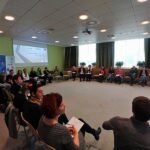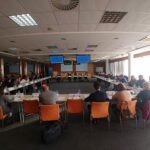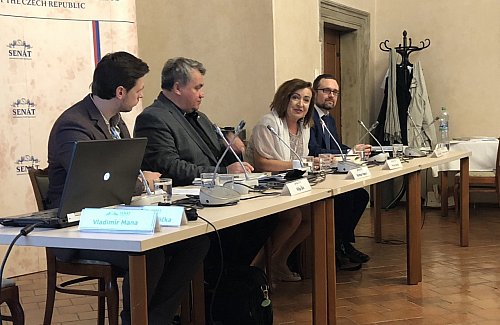DISCUSSING PARTICIPATION IN THE CZECH REPUBLIC – 2ND NATIONAL PARTICIPATION DAY IN THE CZECH REPUBLIC
After a successful first National Participation Day in 2017, the Czech Republic organised a second round on 13 November 2018. This year, the Senate of the Parliament of the Czech Republic and the Platforma rozvoje NNO and member of the European Economic and Social Committee (EESC) organised a Participation Day dedicated to methods of participatory governance and experiences of Czech stakeholders in Prague with around 80 representatives from public authorities, civil society, and research.
PARTICIPATION IS…WORTH THE EFFORT
1st Deputy Chairperson of the Senate of the Parliament of the Czech Republic, Miluše Horská, opened the 2nd National Participation Day with an encouraging welcome note, highlighting the importance of participation for the quality of public policies and the need to enhance participation, despite the challenges and pitfalls that might accompany the process.
Claudia Singer, Coordinator of the EUSDR Priority Area Institutional Capacity & Cooperation and Stefan Lütgenau, President of the Danube Civil Society Forum, reiterated the role of participation to implement basic European values and principles and to enhance the performance of decision-making and policy implementation. The format of National Participation Days – promoted by Priority Area Institutional Capacity and Cooperation and the Danube Civil Society Forum – is considered to be a proven tool to gather public and private stakeholders of the EU Strategy for the Danube Region at all levels in order to facilitate exchange of information and coordination. This is a crucial pre-requisite for a coordinated approach to tackle challenges that have an impact on both national level and in the Danube Region.
PARTICIPATION IS…DIVERSE
An expert panel discussed opportunities and pitfalls of participatory governance and civic engagement. The panellists – Dan Jiránek from the Committee of the Regions, Petr Halada, Member of the Presidium of the SMS CZ, David Sláma, Director of the Department for Strategic Development and Coordination of Public Administration at the Ministry of the Interior CZ, Matěj Gregárek from the EU Department and International Cooperation at the Ministry of Labor and Social Affairs CZ, and Vladimír Mana, Deputy Head of State Administration at the Ministry of the Environment of the Czech Republic had an open discussion on the applied methods of participation, their contribution to public policies and their limits to influence possible outcomes.
Kateřina Fialková, Director of the Department of Multilateral Economic Relations at the Ministry of Foreign Affairs CZ reported on the evaluation of the Czech Presidency at the UN Economic and Social Council in 2018 and provided a state of play of global participation.
PARTICIPATION IS…ESSENTIAL
The examples of Agora and the city of Říčan provided interesting insights into applied participatory governance.
Pavel Mička, Agora Central Europe, presented the results of the PAKT project, funded by EEA Grants. The project aims at supporting citizens’ participation in public affairs. For this purpose, the project consortium elaborated methods of participatory governance and approached public administration representatives at all administrative levels, motivating them to engage citizens in decision-making processes. The PAKT project not only advocates participatory governance in public administration and politics, but also provides information and material for participatory governance for interested institutions.
Jitka Vrtalová, Association of Cyclists, and David Michalička, vice-mayor of Říčan, shared their experience with citizens’ participation in Říčan. The city government involved its citizens in the decision-making process on sustainable mobility and reflected on the lessons learnt.
The 2nd National Partiicpation Day in the Czech Republic was moderated by Roman Haken, Platforma rozvoje NNO/European Economic and Social Committee (EESC).




